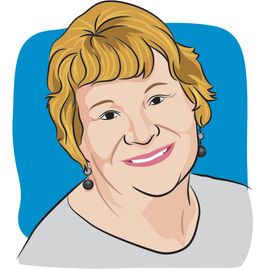- About Us
- Advertise / Support
- Editorial Board
- Contact Us
- CancerNetwork.com
- TargetedOnc.com
- OncLive.com
- OncNursingNews.com
- Terms & Conditions
- Privacy
- Do Not Sell My Information
- Washington My Health My Data
© 2025 MJH Life Sciences™ and CURE - Oncology & Cancer News for Patients & Caregivers. All rights reserved.
My Invisible Losses That Emerge from Cancer

Jane Biehl is a 12-year survivor of a very rare form of blood cancer, known as myelodysplastic syndrome (MDS). She has enjoyed several exciting careers including a librarian, counselor, teacher, and writer. She loves to write about surviving cancer, overcoming hearing loss and the wonderful benefits of having a hearing-ear service dog.
Although MDS didn’t leave physical scars, the invisible ones, like side effects from treatment, are ones that linger.
There have been many blogs and articles written about the side effects and long-term changes in the lives of people who have experienced cancer. Some cancers requiring surgeries leave lasting scars. Others need certain chemotherapies, which cause hair loss. Still, other treatments cause debilitating fatigue and balancing problems, forcing survivors to use canes and walkers for movement.
However, there are many invisible and long-range (meaning forever) problems that may never disappear. I have a type of blood cancer — myelodysplastic syndrome (MDS) — which leaves no visible scars or hair loss, but several invisible ones that are crushing. I had significant amounts of savings never touched and intended to be used for trips when I retired. When cancer struck, I was wiped out of thousands of dollars. I needed bone marrow biopsies twice a year for nine years.
People will say, “But you have insurance.” Yes, but the insurance did not pay 20% which was still $6,000 yearly. As a result, thousands of dollars were spent on treatment before I went on Medicare. I can only pay for the most expensive premiums now to cover my cancer costs, which cost hundreds of dollars each month. I then think of all the people who have lost their homes and jobs and my heart aches for them.
I have written several articles about the side effect of fatigue, which in many cases, never disappears in our altered bodies. I do look well and try to do as much as I can, but I go home exhausted. My red and white blood cells plus my hemoglobin are constantly low, causing neutropenia (lower amounts of white blood cells), anemia and extreme fatigue. I get treated for these side effects with Reblozyl (luspatercept) and other medications, but it is never “normal.”
I have had fibromyalgia for many years, but I cannot exercise as much and I always feel sore. My immune system has to be constantly monitored so I do not get a fatal infection. I already had an immune deficiency called IGA, making the possibility even more dangerous.
I also have shortness of breath, which was initially caused by asthma and is now made worse by fatigue. Muscle aches can occur if I do too much walking because of the red blood cells fighting to circulate through the body. I cannot climb a flight of steps without being exhausted.
I am going to pull a Gibbs from the show “NCIS” and say I am going to smack the next person on the side of the head who tells me this is a result of getting old. Yes, I accept that I am old — 73 — and thankful for every single day of getting older. But I can tell the difference between getting older and cancer exacerbating my symptoms.
Another lasting side effect is the loss of over a dozen teeth. I was the person who never had cavities. The gums soften and affect the mouth tremendously. There is more research being done on this side effect and dentists and researchers are now finding a link. Fortunately, I have a fantastic dentist who invented his own bite splint with artificial teeth, so I can now eat certain foods again. However, this splint cost thousands of dollars and more debt.
The worst and most heartbreaking side effect was the loss of additional hearing. I have been hard of hearing all my life and functioned fairly well with powerful hearing aids and lip-reading. I could attend get-togethers, carry on conversations and usually hear speakers at programs. With a 30-decibel loss, from severe to profound, I am now officially deaf. I hear virtually nothing without my hearing aids. With them, I still cannot understand speech without lip-reading which is why masks were a disaster. I have found some apps that transcribe and help me, but I still miss a tremendous amount. I used to be social, but more and more I find myself avoiding large crowds and being more reclusive. It is still a jolt to tell people I am deaf instead of hard of hearing.
I truly am thankful for life itself and do as much as I can. However, before cancer, I bought into the myth presented by the media and other sources that we are “cured” or “in remission” when we survive cancer, and this is not the case for many patients. We are surviving day by day while mourning the person we used to be. When I go to monthly treatments at the cancer center, I see many patients who smile and look alive despite everything. I credit cherishing what are important accounts for those smiles. But we still miss our old selves.
For more news on cancer updates, research and education, don’t forget to subscribe to CURE®’s newsletters here.
Related Content:



